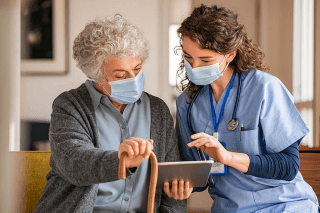Insights
Digital Health Roundtable: the development of data sharing in the NHS
Author
Mark Burton
Health Sector Lead
Virgin Media O2 Business
5 minutes
19th April 2024
Share this article:
In 2021, the Department of Health and Social Care (DHSC) set out a strategy with ambitious plans to harness the potential of data in health and care. A big part of this plan was the introduction of ‘shared care records’, a way to bring together patients’ health information from different hospitals, clinics and social care providers into one digital record.
The past few years have seen NHS clinicians grapple with the implementation of shared care records. Meanwhile, they’ve also been experiencing a huge acceleration in the pace of digital transformation, kickstarted in the wake of the pandemic. With all this in mind, we wanted to know: how is data sharing going for clinicians? How can it be improved? And what’s next for research data? We hosted a roundtable with Digital Health and experts from across the NHS to find out.
Our previous roundtable with Digital Health looked at the challenges and opportunities of digital transformation in the health sector. We saw that there was great potential in digital technology, but there is still more to be done. In the case of data sharing, this latest conversation saw us get to grips with how a learning culture and technology can come together to make it a success.
Shared care records: the current state-of-play
The roundtable kicked off with a broad ask as to how data sharing has been going for our participants.
Mark Thomas, chief digital and information officer at Bedfordshire, Luton and Milton Keynes Integrated Care Board, (ICB) started the discussion by highlighting that whilst progress is going well, ICBs need to be moving at pace to get organisations integrated. The panel agreed, saying that it’s now an established system accepted across NHS England.
Across the 42 Integrated Care Systems (ICSs) within NHS England, there are varying levels of digital maturity, said Asif Shah, deputy chief clinical information officer, Lancashire and South Cumbria Integrated Care Board. What’s helped him is regular meetings and communication between those in the ICC and secondary care.
William Lumb, chief clinical information officer, Lancashire and South Cumbria Integrated Care Board, added that there are currently a number of professionals who still see their role in isolation.
He stated that it’s important to help them understand that they are part of a much bigger system to ensure that the whole system and its patients are getting the most out of shared care records.
Strengthening digital confidence
Our attendees recognised the areas for growth and progress within the capabilities of the shared care records.
Holly Carr, chief clinical information officer at Stockport NHS Foundation Trust stated that NHS professionals need the tools to increase their digital confidence. She highlighted that the technology is already there, alongside the confidence to be able to understand what is possible. What’s missing is the physical infrastructure and building blocks needed to facilitate and enable those achievements.
Chandu Wickramarachchi, chief medical informatics officer at Barking, Havering and Redbridge University Hospitals NHS Trust agreed with this sentiment. He focused on the need for robust workforce training to be able to make the most of the data available within the shared care record.
Time is the most valuable thing to clinicians and NHS professionals. Asif added that this is what will really help ICSs to champion data sharing: providing people protected time within their training and doctors, nurses, allied health professionals, and more.
Standardisation across ICSs is also a necessary next step, the panel agrees. Furthering Asif’s point that there’s different levels of digital maturity, and so standardisation across the board will improve the operation of the whole system.
Holly makes the case for it. She asserted that this doesn’t mean the restriction of autonomy, or inability to make these independent choices. Instead, it’s about bringing expertise into the field to contribute towards one set goal, one set ambition.
Capitalising on existing data
Finally, we discussed what we can be doing to make the most out of research data for population health management.
One problem highlighted was around the potential overwhelming impact of too much data. Some ICSs in fact have more data than they can work with, and it is the analysis of that data that is key. To be making the most out of the abundance of data that is available to NHS professionals, Asif stated that data analysts are needed so that we can see what patterns the data shows regarding population health.
Mark’s approach is to make the most of existing data. The answer, he stated, is not in creating new information, but to bring new people into their team to get better results with the data they already have.
Holly recognised that progressing the capability of research data requires taking a leap of faith to champion innovation. It’s about maintaining momentum and continuing to build on the great work already happening.
Buy-in from clinicians is also needed to use research data to maintain population health. To achieve this, Chandu highlighted the importance of recognising the different capabilities of multidisciplinary employees and ensuring this variety in taken into account when building data analysis workstreams.
What’s next for data sharing across ICSs?
The roundtable showed that whilst it hasn’t been an entirely seamless transition to using shared care records, clinicians have much to be proud of.
Holly noted that since the pandemic, there has been exponential growth in the uptake of technology which has led the NHS to start collect data on a scale that it’s never been able to do before.
What we’re now seeing, however, is that an increase in digital confidence within clinicians is imperative to make the most of data sharing. Providing them with protected time, as Asif stated, is necessary to ensuring that clinicians are provided with the right tools.
Looking beyond shared care records, research data is an exciting tool with much more potential. It has the potential to provide clinicians with trends and data on whole populations to examine the health of their wider locality.
This roundtable demonstrated that clinicians have achieved much over the past few years, especially regarding shared care records. The next step is now to standardise systems to bring the whole system to an equal level.
Want to learn more about the role of data sharing for an integrated NHS?
Read the full write-up from Digital Health here.
And explore our report ‘Bridging the digital gap in UK healthcare’ to find out how you can help build a digital NHS that is accessible to everyone.
Thanks to all those who took part in our roundtable:
- Moderator: Claire Reed, contributing editor - Digital Health
- Mark Burton, Health Sector Lead - Virgin Media O2 Business
- Holly Carr, CCIO - Stockport NHS Foundation Trust
- William Lumb, CCIO - Lancashire and South Cumbria Integrated Care Board
- Asif Shah, Deputy CCIO – South Tyneside and Sunderland NHS Foundation Trust
- Mark Thomas – Chief Digital and Information Officer – Bedfordshire, Luton and Milton Keynes Integrated Care Board
- Chandu Wickramarachchi, Chief Medical Informatics Officer – Barking, Havering and Redbridge University Hospitals NHS Trust
Want to speak to one of the team?
call 0800 064 3790


